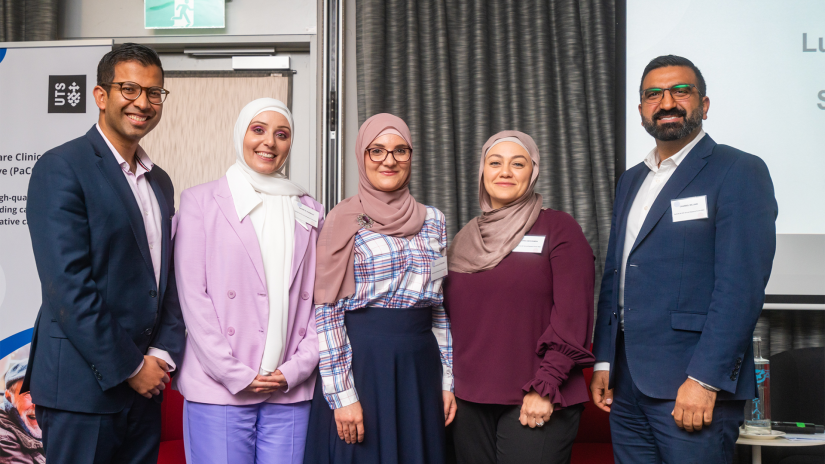The PaCCSC & CST Annual Research Forum 2023 hosted a discussion panel who shared their experience of Arabic-speaking people accessing the Australian healthcare system.

Dr Abhi Pal, Nadine El-Kabbout, Dr Rayan Saleh Moussa, Arwa Abousamra and Dr Charbel Bejjani
In March, we were pleased to welcome guest speaker Professor Miriam Johnson, Associate Director of the Wolfson Palliative Care Research Centre at the University of Hull, to the PaCCSC & CST Annual Research Forum 2023. Miriam’s presentation, Including people from culturally and linguistically diverse communities in clinical studies- could do better… focused on a clinical trial in the UK trial that that gave us an insight into the challenges of recruiting inclusively to clinical trials.
Following Miriam’s presentation, Dr Rayan Saleh Moussa, CST Postdoctoral Research Fellow facilitated a discussion with an engaging and insightful panel of experts on the experience of Arabic-speaking people accessing the Australian healthcare system and their participation in clinical trials.
The panel included Nadine El-Kabbout, Consumer Advisor, Dr Charbel Bejjani, Palliative Care Specialist, Arwa Abousamra, Certified Arabic Interpreter, and Dr Abhi Pal, Medical Oncology Staff Specialist.
The themes for the discussion were reality/lived experience, challenges in context of clinical trials, and potential solutions. This invaluable conversation only scratched the surface of the issues facing culturally and linguistically diverse (CALD) communities’ access to healthcare in Australia.
Given we know that health outcomes are poorer for CALD communities who are underrepresented in clinical research, we need to make clinical trials more accessible. A first step would be to remove English proficiency as an inclusion criterion. We also need to ensure access to medical interpreters.
Dr Abhi Pal said, “It’s intolerable that there are any clinical trials in cancer in Australia today that has ‘non-English speaking’ as an exclusion criterion.”
Arwa Abousamra, a medical interpreter and translator, said, “If we can’t speak the language, we can’t get all the facts. The best, most effective way is a highly qualified medical interpreter.” Arwa Abousamra
For consumers, we know that navigating health services can be confusing. In Australia, this can be challenging for those whose first language is not English and also for those who are fluent in English but their cultural values and customs are not considered.
Nadine El-Kabbout shared her experience as a Non-Hodgkins Lymphoma survivor and consumer advocate, “As a patient, there was little guidance on navigating health services and there were many obstacles and challenges that weren’t culturally sensitive or appropriate.”
Language is just one barrier to healthcare services and facilitating language access is crucial. However, it is more than just language; culture and spiritual influences must also be considered.
Arwa said, “It is important to have an understanding of patients’ spiritual and cultural backgrounds. This is what guides them in terms of decision making - beliefs and family background.”
It is also important to consider the level of health literacy in CALD communities. Limited resources impact the time and funding available to ensure that patients get clear information via qualified medical interpreters.
Dr Charbel Bejjani said, “Individuals from CALD communities may have low health literacy, making it challenging to explain standard care procedures, let alone clinical research. Then you've got to factor in other limitations such as clinician time, resources and funding as well as timely access to interpreters within the Health service."
There is a lot of work to be done to make clinical trials more inclusive and we are all accountable in our roles in clinical research.
“Essentially, we here in this room are the gatekeepers to our research and we have the choice to either exclude or include CALD communities. Embrace diversity within your teams, engage with the communities you wish to service, and develop solutions together. In Australia, we pride ourselves on being the land of the fair go, it’s time we come together and provide a fair go for all.” Dr Rayan Saleh Moussa
Rayan is overseeing a research program focused on diversity and inclusion in cancer clinical trials. Her current project is recruiting healthcare professionals to focus groups to seek their perspectives on the barriers and enablers of cancer clinical trial participation in the Australian Arabic-speaking community.

